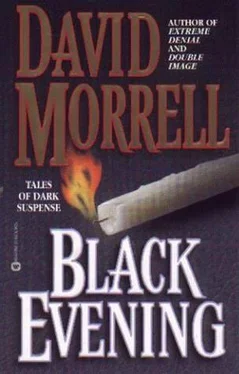David Morrell - Black Evening
Здесь есть возможность читать онлайн «David Morrell - Black Evening» весь текст электронной книги совершенно бесплатно (целиком полную версию без сокращений). В некоторых случаях можно слушать аудио, скачать через торрент в формате fb2 и присутствует краткое содержание. Жанр: Ужасы и Мистика, на английском языке. Описание произведения, (предисловие) а так же отзывы посетителей доступны на портале библиотеки ЛибКат.
- Название:Black Evening
- Автор:
- Жанр:
- Год:неизвестен
- ISBN:нет данных
- Рейтинг книги:4 / 5. Голосов: 1
-
Избранное:Добавить в избранное
- Отзывы:
-
Ваша оценка:
- 80
- 1
- 2
- 3
- 4
- 5
Black Evening: краткое содержание, описание и аннотация
Предлагаем к чтению аннотацию, описание, краткое содержание или предисловие (зависит от того, что написал сам автор книги «Black Evening»). Если вы не нашли необходимую информацию о книге — напишите в комментариях, мы постараемся отыскать её.
Black Evening — читать онлайн бесплатно полную книгу (весь текст) целиком
Ниже представлен текст книги, разбитый по страницам. Система сохранения места последней прочитанной страницы, позволяет с удобством читать онлайн бесплатно книгу «Black Evening», без необходимости каждый раз заново искать на чём Вы остановились. Поставьте закладку, и сможете в любой момент перейти на страницу, на которой закончили чтение.
Интервал:
Закладка:
"My wife and son believe. It isn't fair to make them suffer. Please." My voice rose. "I shouldn't have said what I did. I'm sorry. Make it stop."
The old man squirmed.
I sank to my knees, kissed his hand, and sobbed. "I know I don't deserve it. But I'm begging you. I've learned my lesson. Stop the rain."
The old man studied me and slowly nodded. The doctor tried to restrain him, but the old man's strength was extraordinary. He crawled from bed. He hobbled. Slowly, in evident pain, he chanted and danced.
The lightning and thunder worsened. Rain slashed the windows. The old man strained to dance harder. The frenzy of the storm increased. Its strident fury soared. It reached a crescendo, hung there – and stopped.
The old man fell. Gasping, I ran to him and helped the doctor lift him into bed.
The doctor scowled. "You almost killed him."
"He isn't dead?"
"No thanks to you."
But that was the word I used: "Thanks." To the old man and the powers in the sky.
I left the hospital. The sun, a once common sight, overwhelmed me.
Four days later, back in Iowa, I got the call. The agent from the government. He thought I'd want to know. That morning, the old man had died.
I turned to Gail and Jeff. Their colds were gone. From warm sunny weeks while I was away, their skin was brown again. They seemed to have forgotten how the nightmare had nearly destroyed us, more than just our lives, our love. Indeed they were now skeptical about the Indian and told me that the rain would have stopped, no matter what I did.
But they hadn't been in the hospital to see him dance. They didn't understand.
I set the phone down and swallowed with sadness. Stepping from our house – it rests on a hill – I peered in admiration toward the glorious sky.
I turned and faltered.
To the west, a massive cloudbank approached, dark and thick and roiling. Wind began, bringing a chill.
September twelfth. The temperature was seventy-eight. It dropped to fifty, then thirty-two.
The rain had stopped. The old man had done what I asked. But I hadn't counted on his sense of humor.
He had stopped the rain, all right.
But I had a terrible feeling that the snow would never end.
If there's a touch of humor in "The Storm," there's nothing at all humorous in this further story about the Midwest: a gross-out shocker. Although the story was published in 1984, its origin is eleven years earlier. In the summer of 1973, I spent thirty-five days on a survival course in the Wind River mountains of Wyoming. The course was conducted by Paul Petzoldt's National Outdoor Leadership School and trained its students in a variety of mountaineering skills: climbing, camping without a trace, crossing wild streams, living in snow caves, scavenging, etc. At the end of the course, our food was taken away from us. We were each allowed to keep a compass, a map, and a canteen. We were shown a spot on the map, fifty miles away, over the continental divide, and told that three days later a truck would be waiting to pick us up.
How did we eat? We weren't supposed to. The idea was to replicate an emergency situation. Scavenging uses more energy than is supplied by the plants that are scavenged, so that was out. We could have caught and eaten fish, which would have given us adequate protein, but that would have been as a last measure. The idea was to prove to us that we could go three days without food, in strenuous conditions, and still be functional at the end. I was weak and light-headed when we came over the mountains and reached the dusty trailhead that was our destination, but I could have gone a day or two longer, and I certainly had acquired confidence about the outdoors. The course completed, I set out toward Iowa along Interstate 80, but my old four-cylinder Porsche 912 developed engine trouble, and in the Nebraska panhandle, I had to leave the highway, hoping to find a mechanic. That's when I came to this very unusual, very scary town. While the story is fictional, the setting is not.
For These and All My Sins
There was a tree. I remember it. I swear I'd be able to recognize it. Because it looked so unusual.
It stood on my left, in the distance, by Interstate 80. At first, it was just a blur in the shimmering heat haze, but as I drove closer, its skeletal outline became distinct. Skeletal: that's what struck me at first as being strange. After all, in August, even in the sun-parched Nebraska panhandle, trees (the few you see) are thick with leaves, but this one was bare.
So it's dead, I thought. So what? Nothing to frown about. But then I noticed the second thing about it, and I guess I'd subconsciously been reacting before I even realized what its silhouette resembled.
Stronger than resembled.
I felt uneasy. The tree was very menorahlike, a giant counterpart of the candelabrum used on Jewish religious services. Eight candles in a row. Except in this case the candles were barren branches standing straight. I shrugged off an eerie tingle. It's just a freak, an accident of nature, I concluded, although I briefly wondered if someone had pruned the tree to give it that distinctive appearance and in the process had unavoidably killed it.
But coincidence or not, the shape struck me as being uncanny – a religious symbol formed by a sterile tree ironically blessing a drought-wracked western plain. I thought of The Waste Land .
For the past two weeks, I'd been camping with friends in the Wind River mountains of Wyoming. Fishing, exploring, rock-climbing, mostly sitting around our cook fire, drinking, reminiscing. After our long-postponed reunion, our time together had gone too quickly. Again we'd separated, heading our different ways across the country, back to wives and children, jobs and obligations. For me, that meant Iowa City, home, and the University. As much as I wanted to see my family again, I dreaded the prospect of still another fall semester, preparing classes, grading freshmen papers.
Weary from driving (eight hours east since a wrenching emotional farewell breakfast), I glanced from the weird menorah tree and realized I was doing seventy. Slow down, I told myself. You'll end up getting a ticket.
Or killed.
And that's when the engine started shuddering. I drive a secondhand Porsche 912, the kind with four cylinders, from the sixties. I bought it cheap because it needed a lot of body work, but despite its age, it usually works like a charm. The trouble is, I didn't know the carburetors had to be adjusted for the thinner air of higher altitude, so when I'd reached the mountains in Wyoming, the engine had sputtered, the carburetors had overflowed, and I'd rushed to put out a devastating fire on the engine. In Lander, Wyoming, a garage had repaired the damage while I went camping with my friends, but when I'd come back to get it, the accelerator hadn't seemed as responsive as it used to be. All day, the motor had sounded a little noisier than usual, and now as it shuddered, it wasn't just noisy, it was thunderous. Oh, Christ, I thought. The fire must have cracked the engine block. Whatever was wrong, I didn't dare go much farther. The steering wheel was jerking in my hands. Scared, I slowed to thirty. The roar and shudder persisted. I needed to find a mechanic fast.
I said this happened in Nebraska 's panhandle. Imagine the state as a wide rectangle. Cut away the bottom left corner. The remaining top left corner – that's the panhandle, just to the east of Wyoming. It's nothing but broad flat open range. Scrub grass, sagebrush, tumbleweed. The land's as desolate as when the pioneers struggled across it a hundred years ago. A couple more hours into Nebraska, I wouldn't have worried too much. Towns start showing up every twenty miles or so. But heading through the panhandle, I hadn't seen a sign for a town in quite a while. Despite the false security of the four lane Interstate, I might as well have been on the moon.
Читать дальшеИнтервал:
Закладка:
Похожие книги на «Black Evening»
Представляем Вашему вниманию похожие книги на «Black Evening» списком для выбора. Мы отобрали схожую по названию и смыслу литературу в надежде предоставить читателям больше вариантов отыскать новые, интересные, ещё непрочитанные произведения.
Обсуждение, отзывы о книге «Black Evening» и просто собственные мнения читателей. Оставьте ваши комментарии, напишите, что Вы думаете о произведении, его смысле или главных героях. Укажите что конкретно понравилось, а что нет, и почему Вы так считаете.












